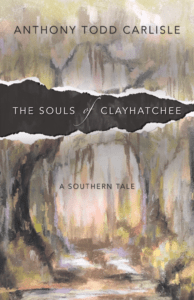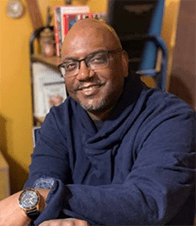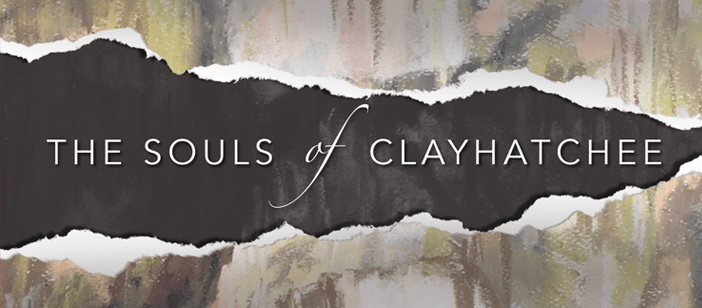From the publisher: “James Kingsman hated the South.
Raised by parents who had migrated north from Alabama years before his birth, he had heard their personal stories of racism, injustice, fear. At best, he carried a certain disdain for those who stayed behind, no matter how much the South had changed.
When James reluctantly agrees to his mother’s last wish to be buried in her hometown of Clayhatchee, Alabama, his notions about southern relatives are turned upside down as he makes long-hidden discoveries about his parents. His father did not migrate north, he escaped. His mother kept an even deeper secret, one of rage and beauty.
Some ghosts cannot stay buried…”
About the author: “Anthony Todd Carlisle, Ph.D., is married to Amy Alexander, Ph.D., and has two children, Arielle and Amya. He is an associate professor in the Department of Culture, Media, and Performance at California University of Pennsylvania.
Carlisle was a reporter for 11 years. He worked for the New Pittsburgh Courier, Daily News, Pittsburgh Business Times, Beaver County Times and Pittsburgh Tribune-Review. During those years, he worked in several beat areas: city government, urban affairs, religion, education, transportation, labor and sports as a business. As a reporter, he won several awards, including Robert L. Vann Award for feature writing and investigative reporting and the Keystone State Spotlight Award for first place business story.
Carlisle is also a veteran, having served in the United States Army Reserve for 14 years, reaching the rank of captain. He worked as both a supply officer and a military journalist. In 2003, he was deployed to the Middle East as part of Operation Iraqi Freedom. Upon his return, he was awarded California University of Pennsylvania’s Presidential Medal for Patriotic Service.”
The Souls of Clayhatchee will be released May 4, 2021 and is now available for pre-order.
 I was heading back home. Not the home that I knew as a child, but a home that was mine all the same. It was the beloved home of my mother in all of its Jim Crow past. It was the home of my father, who barely survived it with all of his ornery ways. It was the home of their parents and their parents’ parents, who picked cotton, sharecropped, and worked the land until they no longer could. And it was home to their ancestral enslaved parents who toiled day and night under the firm grip of massa’s whip. Clayhatchee, Alabama was my inherited home—collard greens, black-eyed peas, chitterlings, string beans, sweet yams, cornbread, and all. It was a home that I needed to get back to… more than I could ever know.
I was heading back home. Not the home that I knew as a child, but a home that was mine all the same. It was the beloved home of my mother in all of its Jim Crow past. It was the home of my father, who barely survived it with all of his ornery ways. It was the home of their parents and their parents’ parents, who picked cotton, sharecropped, and worked the land until they no longer could. And it was home to their ancestral enslaved parents who toiled day and night under the firm grip of massa’s whip. Clayhatchee, Alabama was my inherited home—collard greens, black-eyed peas, chitterlings, string beans, sweet yams, cornbread, and all. It was a home that I needed to get back to… more than I could ever know.
Mama was dead and Daddy had died six months earlier. But it was Mama who made me leave New York—my job, my plush condo, my ex-girlfriend—and drive 1,130.38 miles and nearly nineteen hours on I-81 South. Mama made it back home before I did. Well, Mama’s body made it there, where it was received by her sister, Aunt Dee. Mama desperately needed to be buried in Clayhatchee, even after building a life in the North for more than half a century.
 Mama told Daddy she would go back home someday, but Daddy had been adamant about never returning. That place meant nothing to him but rednecks, crackers, abuse, and oppression. He was too old now for any of that foolishness and thought it was a damn fool notion for Mama to return. Mama argued that things had changed, that the South they knew no longer existed. She would tell Daddy how the South had elected Black mayors, council members, sheriffs, and judges; and that Black people had really moved up the ladder to become middle class. All that “foolishness” they knew was over. Daddy, though, never bought it. And for Mama’s part, she kept threatening the old man that she would leave him and make her way home.
Mama told Daddy she would go back home someday, but Daddy had been adamant about never returning. That place meant nothing to him but rednecks, crackers, abuse, and oppression. He was too old now for any of that foolishness and thought it was a damn fool notion for Mama to return. Mama argued that things had changed, that the South they knew no longer existed. She would tell Daddy how the South had elected Black mayors, council members, sheriffs, and judges; and that Black people had really moved up the ladder to become middle class. All that “foolishness” they knew was over. Daddy, though, never bought it. And for Mama’s part, she kept threatening the old man that she would leave him and make her way home.
If she really wanted to leave Daddy, Mama had her pick of reasons, starting with his cheating ways. Daddy loved women and women loved Daddy. Mama, for years, looked the other way until one day she stopped and looked Daddy square in the eyes. He had to make a choice between having a lifetime of true love with his wife and kids or having fleeting moments from an array of low, no-account fast women. Daddy chose correctly and remained in good marital standing for the rest of his life. Nonetheless, he remained hard as steel. Hard on Mamma, hard on his children, hard on life. Daddy carried around a mean streak that kept him from fearing any man and one that called on those he encountered to respect him always or to disrespect him at their own peril. One thing for certain, Daddy loved Mama, and he would kill for her. And Mama loved Daddy, even with all his disagreeable ways.
Soon after Daddy died, Mama was planning a trip to Clayhatchee, announcing that she would be returning with a surprise. She was excited about returning home. Clayhatchee had grown from the small, clay dirt town of the 1930s and ’40s that she and Daddy knew when they were young. Now, in 2004, it was a small city featuring quaint neighborhoods and historic districts. The community of 18,000 residents promoted itself as a tourist destination, particularly those interested in the mid-twentieth century civil rights struggle. It was the home of Clayhatchee University, which transformed from a small state teachers’ college in the nineteenth century to a world-class education center of research and technology.
Mama was making preparations to visit her childhood home when she suffered a stroke. With each passing day, deterioration made her less my mama—the woman who had remained vibrant and energetic as she aged—and more of an unrecognizable, feeble old woman who seemed to welcome death. Just four months after suffering her stroke, Mama had become bedridden, going in and out of consciousness. The doctor said she was dying. With that, the family rallied around Mama to ensure her affairs were in order. It was during this time that Mama, in a moment of clarity and consciousness, made me promise that her final resting place would not be Pittsburgh, but the dark rich soil of Clayhatchee.
As I took exit 79, I felt a gush of heat so intense it seemed to singe my eyebrows. The air was thick, making my breathing a concerted effort between my brain and lungs. It was the type of heat that gives the illusion the air is on fire.
As much as the South claimed its modernity, I felt as if I had been transported to an early period. The homes located just off the exit were more shanty than houses and the spacing of the homes provided a sense of desertion. At one shanty home, a dark-skinned boy—couldn’t be any older than four—stood on the wooden porch, barefoot and shirtless. Behind him, a young girl opened the screen door, a smaller child on her hip.
In all that emptiness, a BP gas station seemed to sprout. I needed a drink, gas, and, as always, directions. It wasn’t that I was lost. I just didn’t want to become lost.
“How close am I to Clayhatchee?” I asked the white clerk. She was round, puffy, and middle-aged, with black-rimmed glasses that intersected with her brown curly hair. She had a generous smile.
“Honey, you’re about a half an hour away. Just stay on this street until you see Route 8 and then make a left. I live in Clayhatchee. Where exactly are you trying to go?”
“I’m trying to find 146 Robinson Road.”
“Oh, I can tell you how to get to Robinson Road. Route 8, after two miles, turns into Robinson Road. You will see MLK Elementary School on your left. Go past MLK, but don’t go past Mount Zion Baptist Church or you’ve gone too far. It’s a straight shot, pretty simple. You have a good day, sweetie, and welcome to Clayhatchee.”
Not the reception I thought I would receive from the first white person I encountered in the land of Dixie. I had seen those PBS specials—Black folks marching, attack dogs barking, white people shouting, and redneck police officers swinging clubs. It couldn’t be the South my father fled in 1949, but I had been mentally preparing myself for whatever residual racist attitudes lingered from the sting of nearly three hundred years of slavery and another hundred years of Jim Crow torture, degradation, and discrimination. I didn’t care what Mama said, racial problems persisted in the North, so I was certain they hadn’t been eradicated in the South. It didn’t matter how many schools we integrated, lunch counters we ate at, how many millions we made singing, dancing, running, shooting, and catching, or how many white girls or boys we were humping, racism was alive and well and breathing lustily throughout America, North and South.
No, heading this far down South had never appealed to me. Plus, I’m its worst nightmare—an educated Black man who didn’t ascribe to King’s position of turning the other cheek. If you don’t know, now you know… baaaby, baaaby.
But I admit to being curious about my parents’ heritage and how much had changed in the land of cotton. I wanted to see what it was about, maybe uncover some buried family secrets and fossils. Something significant had occurred there. Mama would not let it go and Daddy chose not to remember. I wanted to know what it was.
Why did my mother love this place? Why did my father despise it? How much different would my experience be from hers, from his, from theirs? Why did she have to be buried here and, more importantly, why did I have to be the one to do it?
When I left for Alabama, it was just to bury Mama. Turns out I was going there for much more than I could have ever imagined. The rattling from ghosts of the past grew louder the closer I came to Clayhatchee.
This excerpt from The Souls of Clayhatchee by Dr. Anthony Todd Carlisle is published here courtesy of the author and should not be reproduced without permission.

























